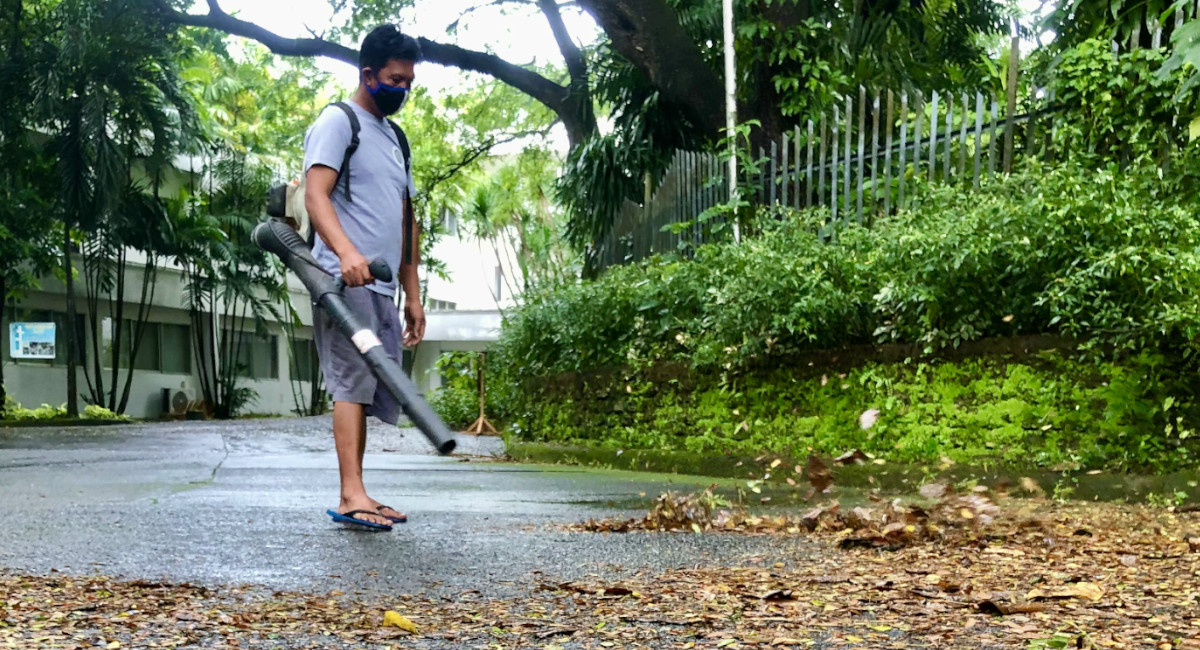
For the past 17 years, I have been part of the Jesuit Mission in Cambodia. A significant part of that time has been with local communities, some indigenous minorities, accompanying them as they lead in protecting their natural heritage. I have since been reassigned to the Philippines, my home province, to a more urban setting. As we are all faced with mounting pressures on our climate, biodiversity, pollution, our common home in need of greater care, perhaps sharing thoughts or discussing these concerns among ourselves might be a useful step forward. It is my hope that this space, Reconciliation with Creation, might serve this purpose.
—
Leaf blowers, found in many major cities around the world, are portable machines that are used to corral dried leaves by blowing them into a pile. Its origins can be traced to a Japanese company that made gas-powered backpack crop dusters in the 1950s, machines that blew pesticides and fertilisers onto plantations. They quickly discovered that without the chemicals, the machine could be used simply to blow and gather fallen leaves and other light debris. In the decades that followed, many urban communities exchanged the humble broom or rake for leaf blowers that seemed to do the job faster and more efficiently. However, more and more cities are declaring bans on the leaf blower. Below are the main reasons why I believe leaf blowers have no place in our society today.
Dirty tech
Majority of the leaf blowers being used today have a petrol-powered two-stroke engine, known for being cheap, light, and having a high power-to-weight ratio. However, since it lacks an independent lubrication system, oil (purchased from the leaf blower manufacturer) has to be mixed with the petrol, resulting in several problems. For starters, around 30 per cent of the petrol does not combust and comes out as unburned aerosol. Along with it are discharges, such as carbon monoxide (colourless, odourless gas that reduces oxygen delivered to vital organs, such as the heart and brain), nitrous oxides (greenhouse gases), and hydrocarbons (carcinogenic gases that also cause smog). So much air pollution comes from these engines that the California Air Resources Board, citing a 2021 study, noted, “For a commercial leaf blower, one hour of operation emits smog-forming pollution comparable to driving a new light-duty passenger car about 1100 miles (1770 km).”
Another form of pollution that leaf blowers are known for is noise. Sounds below 70 dB (decibels) are considered safe. But leaf blowers usually operate above 90 dB, enough to cause premature hearing loss over time. In addition, the quality of the sound energy coming from a leaf blower is at the low frequency range, meaning that it can travel long distances and pass through barriers, such as walls, windows, and most hearing-protection devices. As a result, manufacturers have turned to electric-powered leaf blowers. But are they any less dangerous?
Disturbing natural ecology
Leaf blowers, gas-powered or electric, still produce air blasts of 170 mph (274 kph) and higher. In human terms, this would be equivalent to a category 5 (the strongest) hurricane passing through the city. Winds from the leaf blower stir up particulate matter such as pollen, mould, animal faeces, heavy metals, and pesticides, while also contributing to smog and lower air quality. According to Clean Alternative Landscaping Methods, “Approximately 5 lbs (2.27 kg) of particulate matter per leaf blower per hour are blown into the air and can take hours and even days to settle.”
Fallen leaves are an important part of a tree’s natural nutrient cycle. Invertebrates such as snails feed on dead leaves, and their waste, rich in minerals and nutrients, are colonised by fungi and bacteria. They, in turn, digest the complex organic molecules and deposit them in a form that plants can readily absorb. Thus, elements, such as nitrogen, phosphorous, and potassium, coming from the dead leaves are recycled back into the community of trees and plants, fuelling further growth. This cycle is one of the main reasons why trees in their natural setting, where fallen leaves are not removed, have generally better health than their urban counterparts that need artificial fertilizers. In addition, organic matter, and macro and microfauna in the soil contribute to a more complex soil ecosystem, and consequently, to increased soil fertility.
It is also worth mentioning that fallen leaves create microclimates and microhabitats for a variety of smaller insects. They then support larger wildlife, such as spiders and centipedes, which also help control garden pests and mosquitoes. Birds are attracted to a robust insect population, creating a healthy and balanced system. Thus, interrupting the nutrient cycle and disrupting insect habitats, as leaf blowers tend to do, contribute to simplifying and degrading our surrounding natural system.
Passing the burden
In several big cities, the work that was once accomplished by a broom or a rake has been replaced by a leaf blower, doing the same job faster and supposedly more efficiently. However, in reality, the “burden” of doing the task faster has only been transferred onto creation. The advantages of speed and efficiency are made possible only by creating disadvantages for nature, other creatures, the machine operator (most likely a member of a marginalised community), and many others who will be impacted by a compromised and weaker ecosystem. For the convenience of a few who can afford leaf blowers, the costs of increased pollution and weaker ecosystems are imposed upon the many. Isn’t this simply a manifestation of the same unjust power-structure that we should be working against? Isn’t the call for us today a deeper, more harmonious communion with the rest of creation?
An important aspect of ecological conversion, of which Pope Francis speaks in Laudato si’, is to move away from an over-dependence on technology and overt anthropocentrism. As it says in paragraph 122, “A misguided anthropocentrism leads to a misguided lifestyle…. When human beings place themselves at the centre, they give absolute priority to immediate convenience and all else becomes relative.” In today’s world where we should be weaning ourselves from a fossil-fuel-driven culture, perhaps giving up old tech that harms others would be a good place to start.
With the current crises of climate, floods, fires, and loss of biodiversity, which are projected to only get worse, we are called to do our share, to help nature and take some of the burden upon our shoulders. One way could be to return to our humble hand tools, even if doing the job may take a little more effort and a little more time.
 Fr Gabriel Lamug-Nañawa SJ is the Coordinator of the Reconciliation with Creation network of the Jesuit Conference of Asia Pacific. Each month, he shares his reflection on everything ecology using the lens of Ignatian Spirituality.
Fr Gabriel Lamug-Nañawa SJ is the Coordinator of the Reconciliation with Creation network of the Jesuit Conference of Asia Pacific. Each month, he shares his reflection on everything ecology using the lens of Ignatian Spirituality.

